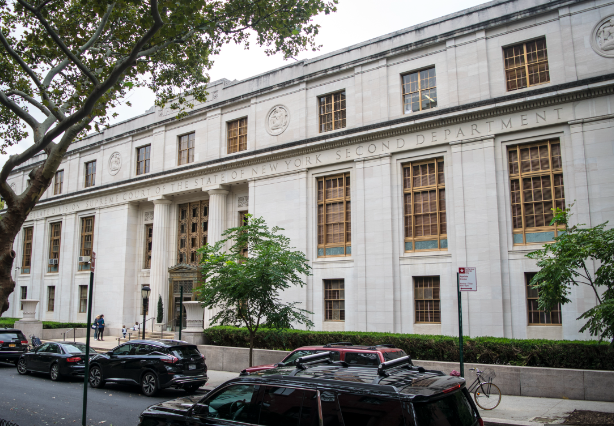
Latest decisions from the Appellate Division, Second Department

Family court’s decision on child abuse, upholding custody changes and conditions for mother affirmed
The Appellate Division, Second Judicial Department, has affirmed decisions from the Family Court of Kings County concerning Magali M. C., who was found to have allowed abuse against three children under her care. The case, which brought to light allegations against Eduardo R. for sexually abusing the children, concluded with a ruling that substantiated the claims of abuse.
The proceedings began with the Administration for Children’s Services (ACS) alleging that Eduardo R. committed acts of abuse against Emily R., Estephania G.-M., and Miranda G.-C. The Family Court’s fact-finding process concluded that Eduardo R. had sexually abused the children and that Magali M. C. had knowledge of these actions yet failed to intervene, thus constituting abuse on her part as well. Following the hearings, Family Court Judge Michael Milsap placed Emily R. and Estephania G.-M. in the custody of the Commissioner of Social Services of the City of New York and imposed specific conditions on Magali M. C. to address the welfare of the children.
Magali M. C. appealed the decision, particularly challenging the use of the children’s out-of-court statements. However, the appellate panel upheld the Family Court’s decision, agreeing that the statements were sufficiently corroborated and that the evidence presented met the legal standards required to establish abuse under the Family Court Act.
– In the Matter of Emily R. (Anonymous) –
Appellate Division clarifies insurance coverage in construction case
In a recent decision by the Appellate Division, Second Department, a previous ruling by the Supreme Court, Kings County, was reversed regarding insurance obligations in the construction industry. The case involved the New York City Housing Authority and several other entities (plaintiffs) against Harleysville Worcester Insurance Company (defendant). The plaintiffs sought a declaration that Harleysville was obligated to defend and indemnify them under a subcontractor’s insurance policy regarding a personal injury lawsuit.
Initially, the Supreme Court of Kings County denied Harleysville’s motion for summary judgment, which would have dismissed the claim that Harleysville had such an obligation. Upon review, the Appellate Division found that Harleysville was not obligated to defend and indemnify the plaintiffs, as they were not named as additional insureds under the subcontractor’s insurance policy. This appellate decision overturned the lower court’s ruling, clarifying that the general contractor alone, who had a direct contract with the subcontractor, qualified for additional insured status under the specific terms of the policy.
The case has been remitted back to the Supreme Court for the entry of a judgment in line with the Appellate Division’s findings.
– New York City Housing Authority v. Harleysville Worcester Insurance Company –
Appellate Division upholds Family Court decision in child neglect case
The Appellate Division, Second Judicial Department, has affirmed a Family Court decision from Kings County, finding Lewis N. guilty of child neglect. The case centers around incidents of domestic violence in close proximity to his child, Xierra N.
The Administration for Children’s Services (ACS) initiated proceedings under Family Court Act article 10, alleging Lewis N. neglected Xierra by engaging in violent acts near her. Evidence presented during the fact-finding hearing included a particularly severe incident where Lewis N. engaged in a physical altercation and discharged a firearm while Xierra was left unattended nearby. This behavior led to the Family Court’s determination of neglect, citing the potential and actual impairment to the child’s physical and emotional condition due to exposure to violence.
The appellate ruling upheld the Family Court’s judgment, agreeing that a single act of domestic violence within close proximity to a child can constitute neglect. Lewis N.’s appeal, which contested the interpretation of his actions as neglectful, was dismissed.
– In the Matter of Xierra N. (Anonymous) –
Appellate Division affirms termination of parental rights
The Appellate Division, Second Judicial Department upheld a Family Court decision from Kings County that terminated the parental rights of Shamica M. C. over her child, Remi-Radell J. C.-G., due to abandonment and permanent neglect. The case, initiated by Children’s Aid under Social Services Law § 384-b, sought to legally sever Shamica M. C.’s parental ties after the child was placed with foster parents in February 2018.
The Family Court, after conducting fact-finding and dispositional hearings, found clear evidence of both abandonment and permanent neglect by the mother. The court heard that despite being capable, Shamica M. C. failed to maintain meaningful contact or plan for the child’s future, constituting neglect. Furthermore, her sporadic interactions during a critical six-month period prior to the petition filing were deemed insufficient to counter the claims of abandonment.
In its judgment, the Family Court ordered the transfer of guardianship and custody of the child to Children’s Aid and the Commissioner of the Administration for Children’s Services of the City of New York, enabling the child’s adoption.
– In the Matter of Remi-Radell J. C.-G. (Anonymous) –
Appellate Division modifies murder conviction in mental health-related case
The Appellate Division, Second Judicial Department, has issued a ruling in the case of Spence Andrews, modifying his conviction from murder in the second degree to manslaughter in the first degree. This decision, published on April 10, 2024, comes after the Kings County Supreme Court had earlier convicted Andrews based on incidents that occurred while he was involuntarily committed at Interfaith Medical Center.
The legal issue at the heart of the appeal was whether Andrews, who had a history of mental health issues, was capable of forming the intent necessary for a second-degree murder conviction. The appellate court’s review focused on the evidence surrounding Andrews’ mental state during the incident, particularly his affirmative defense of extreme emotional disturbance.
During the trial, Andrews asserted that he acted under extreme emotional disturbance, a defense that, if accepted, could reduce a charge from murder to manslaughter. The jury initially rejected this defense, leading to the second-degree murder conviction. However, upon reviewing the case, the Appellate Division found that the evidence suggesting Andrews acted under extreme emotional disturbance was compelling enough to merit a reduction in the charge.
The appellate court highlighted that Andrews was suffering from a significant mental health crisis at the time of the incident, noting that his actions were influenced by this disturbed state. It was determined that the jury’s decision to reject the emotional disturbance defense was against the weight of the evidence presented.
– The People v. Spence Andrews –
AD reduces manslaughter charge, cites jury’s right to consider lesser degree
The Appellate Division, Second Judicial Department, has revised a lower court’s ruling in the case of Zhen C. Li, changing his conviction from manslaughter in the first degree to manslaughter in the second degree. This decision follows an appeal from the Supreme Court, Kings County, where Li was originally convicted.
Li was involved in a 2010 incident where, during a physical altercation, he drew a firearm that subsequently discharged, resulting in the death of one individual. At his 2012 trial, the court denied Li’s request to consider manslaughter in the second degree as a possible verdict, a decision which the Appellate Division found to be in error based on the circumstances presented during the trial.
The legal issue central to this appeal was whether the lower court should have allowed the jury to consider a charge of manslaughter in the second degree. The Appellate Division agreed with the defendant’s assertion that there was a reasonable view of the evidence suggesting Li may have been guilty of the lesser crime of manslaughter in the second degree, which implies reckless rather than intentional action.
The Appellate Division’s decision to modify the conviction reflects its assessment that the evidence could support a finding that Li did not intend to fire the weapon. As a result of this ruling, the matter has been remitted back to the Supreme Court, Kings County, for re-sentencing based on the reduced charge.
– People v. Zhen C. Li –
Leave a Comment
Related Articles


Brooklyn Bar Association hosts attorney Jimmy Lathrop for CLE seminar on real estate litigation

Texas governor pardons convicted killer: New York’s AG calls for federal civil rights investigation

Two murders, multiple shootings: 18 alleged Brooklyn gang members charged
Leave a Comment

Brooklyn Heights
View MoreRead the Brooklyn Height's Press and Cobble Hill News. Find out more about Brooklyn Height's History here.
The Brooklyn Daily Eagle and brooklyneagle.com cover Brooklyn 24/7 online and five days a week in print with the motto, “All Brooklyn All the Time.” With a history dating back to 1841, the Eagle is New York City’s only daily devoted exclusively to Brooklyn.
© 2024 Everything Brooklyn Media
https://brooklyneagle.com/articles/2024/05/07/latest-appellate-division-decisions-may-7-2024/
